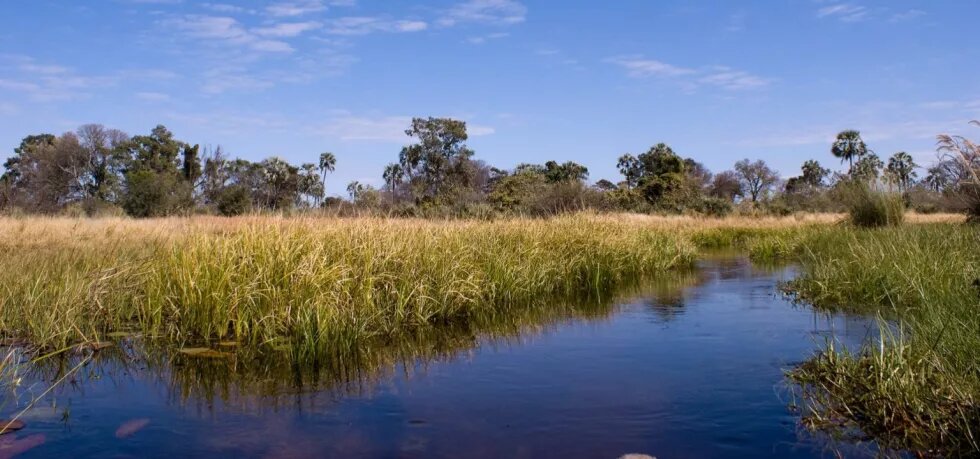The window of opportunity to keep the average global temperature from breaking through the ceiling of 2°C — or preferably 1.5°C — as set out in the UN’s Paris Agreement is closing fast. But for parts of the Kalahari, a vast semi-desert in southern Africa, the battle to stabilise the regional temperature is already lost. Botswana is expected to reach an average warming of 2°C in less than five years. At a time when the science warns that countries need to keep their fossil fuels in the ground, conservationists here have expressed alarm at the news that oil and gas prospecting licenses have been issued for large parts of Botswana and Namibia, including in the ecologically and water-sensitive Okavango Delta and Kgalagadi Transfrontier Park. Leonie Joubert reports

As 2021 begins, Canada-based petroleum exploration company ReconAfrica is sinking a test well in the Kavango Basin, as part of an ongoing effort by prospectors to find new oil and gas reserves in the remote Kalahari wilderness which straddles Namibia and Botswana in southern Africa.
The online title Energy Voice reports that it will take 45 days for ReconAfrica to complete the drilling and analysis of its first test well, but that other wells are also planned soon for the area.
The alarm about this going ahead came through in headlines from high-impact news titles like National Geographic, The Guardian, The Conversation, and the Daily Maverick late last year. The tone of this media coverage is vastly different to the enthusiasm of the exploration company’s public announcements on its own website.
ReconAfrica has been crowing about opening up of the Kavango Basin in parts of the Kalahari which includes the ecologically sensitive Okavango Delta — the headwaters of a system that supplies Namibia with much of its water — as well as in the Kavango-Zambezi Transfrontier Conservation Area, a newly proclaimed protected area with the biggest conservation footprint in southern Africa. The Namibian government has given ReconAfrica access to prospect in an area that is more than 35 000km² in size. Meanwhile the Botswana government has reportedly also issued licenses to other prospecting companies, giving them access to parts of the Kgalagadi Transfrontier Park, just south of where ReconAfrica plans to drill.
According to ReconAfrica’s consulting geochemist Daniel Jarvie, drilling here is a ‘no-brainer’.
‘Given the nature of this basin and the tremendous thickness,’ he is quoted on the front page of the ReconAfrica website, ’it will be productive and I’m expecting high-quality oil.’
Newspaper reporting on these exploration plans has revealed that both the Namibian and Botswana governments have been opaque in the public participation processes relating to the issuing of licenses to allow test drilling to go ahead.
Many conservationists and local communities say they knew nothing about the prospecting plans and have not been consulted.
Today’s water, tomorrow’s climate: reasons to keep Botswana and Namibia’s fossil fuels in the ground
The potential hazard to the region’s already sensitive water system is central to concerns about opening the region up to oil extraction and hydrological fracking (‘fracking’) to extract shale gas. Should any of these activities pollute ground or surface water, it could have devastating consequences for the wider region, already semi-arid and where many parts are dependent on the Okavango Delta for water.
But rapidly rising regional temperatures, and the likelihood of increased extreme drought in the region owing to worsening atmospheric carbon pollution, pose a much more existential threat to the region in the longer term.
Temperature records show that parts of southern Africa have already been warming at twice the global average during the past 50 years, and climate modelers anticipate that this accelerated warming will continue. The University of Cape Town’s Climate System Analysis Group (CSAG) — whose modelers contribute to the UN Intergovernmental Panel on Climate Change’s Assessment Reports — project that Botswana is already locked into a regional warming trend of 2°C, a threshold that it will slip across by 2024.
Drilling up and burning the fossil fuels sitting in the bedrock of these two countries will only contribute to climate-disrupting trends that will, given present pollution rates, result in an irreversible shift in the regional climate. The current trajectory puts the region at an unlivable 6°C warmer by the end of the century. Extreme heat days are already breaking temperature records in the region, and climate models paint a bleak picture of worsening extreme droughts.
Decisions made by the Namibian and Botswana governments in the coming months will have grave consequences for the region.